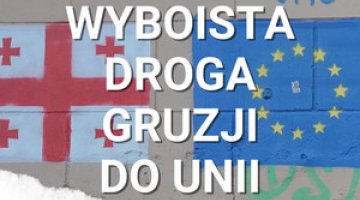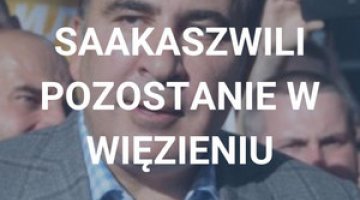Georgia: presidential election amidst intense protests
On 14 December, the electoral college elected Mikheil Kavelashvili as the new President of Georgia (see Appendix). Kavelashvili is one of the leaders of the nationalist-conservative party People’s Power, an organisation closely associated with the ruling Georgian Dream party, which has been in power since 2012. He secured the support of 224 out of 225 participants in the vote, where he was the sole candidate. Both the opposition and the current president, Salome Zourabichvili, have rejected the election result.
The vote was accompanied by intense street protests that began after the 26 October parliamentary election, which the opposition deemed fraudulent (see ‘The fourth term of Georgian Dream: a questionable victory’) and escalated following Prime Minister Irakli Kobakhidze’s 28 November announcement that Georgia would postpone its EU accession talks until 2028 (see ‘Georgia is suspending its EU integration process’). The protesters’ primary demand is a rerun of the parliamentary election under international supervision. The demonstrations are nonpartisan and network-based, organised as grassroots initiatives without a single coordinating centre.
The election of Mikheil Kavelashvili has deepened Georgia’s internal crisis and heightened societal polarisation. President Salome Zourabichvili has declared that she would not step down and proclaimed herself the sole legitimate authority in the country. Although Georgian Dream continues to maintain control, an effective dual power structure has emerged, with unpredictable political and legal consequences. The inauguration of the new president, scheduled for 29 December, is expected to coincide with the peak of protest activity.
Commentary
- The ruling party endorsed Mikheil Kavelashvili as their presidential candidate, counting on his unwavering loyalty. However, his mandate will be weaker than that of previous presidents, as he is the first head of state elected through an indirect rather than a popular vote. The 300-member electoral college comprises all 150 members of parliament (opposition MPs did not participate in the vote) as well as 150 representatives from local governments and the legislative bodies of the autonomous republics of Abkhazia (which operate in exile in Tbilisi) and Adjara. Following constitutional reforms, the president mainly holds a ceremonial function, although he or she has the right to grant pardons.
- For now, it seems unlikely that the protesters will force the government to make concessions. For this to occur, rallies would need to draw significantly larger crowds than they have so far, and a new, prominent leader (or leaders) would need to emerge. This has yet to happen, as neither President Zourabichvili nor the opposition party leaders have presented a coherent action plan. Additionally, signs of erosion and disintegration within the broadly defined ruling camp (including within the public administration) would need to emerge. While there are some early indications that this process has begun (see ‘Georgia: violent protests and signs of erosion in the ruling camp’), the ruling camp has so far remained cohesive.
- At present, the most likely scenario is that Georgian Dream will seek to gradually marginalise Salome Zourabichvili and opposition parties, particularly as their representatives have resigned from parliament, along with the gradual decline of the protests. However, this would neither resolve the crisis nor reduce societal polarisation. Recent incidents of police brutality, involving the excessive use of force against protesters, and the emergence of so-called titushky (pro-government provocateurs), who have targeted opposition media representatives and other individuals, have further deepened divisions. It remains unlikely that the demonstrations will evolve into a Georgian ‘Maidan’ or lead to a rerun of the parliamentary election. The swearing-in of the new president on 29 December, which protesters are expected to attempt to block, will serve as a critical test of their strength and the government’s resolve. From that day, Georgia may face a situation of dual power with all its accompanying consequences. There is also the possibility that the new authorities will attempt to bring criminal charges against Zourabichvili and have her arrested. In recent days, parliament has decided to strip Zourabichvili of security provided to former heads of state, effective once Kavelashvili is sworn in.
- If the government in Tbilisi maintains the country’s current political course, Georgia risks isolation from the West, although losing its EU candidate status (granted in December 2023) seems unlikely. Consequently, the country may drift further towards Russia and, to a lesser degree, China.
- The newly elected president received his first congratulatory messages from the leaders of Armenia and Azerbaijan. This highlights the importance these countries place on Georgia’s stability, which is crucial to them as a key transit state. Prime Minister Nikol Pashinyan and President Ilham Aliyev associate this stability with the continued rule of Georgian Dream, being also among the first leaders to congratulate the party after the most recent parliamentary election.
- For now, representatives of the West, primarily parliamentarians, have criticised the election of Georgia’s new head of state. On 12 December, the US Department of State announced an expansion of visa sanctions to additional individuals whom Washington deems to be undermining democracy in Georgia. In the following days, the Baltic states followed suit.
Appendix. Kavelashvili’s profile
Mikheil Kavelashvili (b. 1971 in Bolnisi, Georgia) – former footballer turned politician. Initially, he played football in Georgia (from 1989), before transferring to Manchester City F.C. of the Premier League (1995-1997) and later moving to the Swiss Super League (1998). He eventually retired from professional football in 2008.In 2016 and 2020, he was elected as a member of parliament representing Georgian Dream. He lacks any significant personal achievements outside of sports and the opposition repeatedly pointed out that he had played for the Russian club Spartak-Alania Vladikavkaz, which further ties him to his political patrons. He has no university degree, which previously prevented him from running for the position of the head of the Georgian Football Federation.
The party co-founded by Mikheil Kavelashvili, People’s Power, is effectively an extension of Georgian Dream. It formally split from Georgian Dream to attract the most conservative and strongly nationalist portion of the electorate and to propose potentially controversial legislative initiatives. In 2023, People’s Power proposed enacting a law on foreign agents. However, under public and Western pressure, the ruling majority initially withdrew the draft from parliamentary consideration, only to reintroduce it later. It was eventually passed a year later under a modified name. The party’s MPs were originally elected from Georgian Dream’s lists.
Mikheil Kavelashvili is the third president elected with the support of Georgian Dream. His predecessors, Giorgi Margvelashvili (2013–2018) and Salome Zourabichvili (2018–2024), eventually clashed with the party and joined the opposition. However, both consistently represented a firmly pro-European stance, regardless of their shifting political sympathies. In contrast, Kavelashvili portrays himself primarily as a proponent of ‘traditional’ conservative values, aligning himself more closely with influential hierarchs of the Georgian Orthodox Church, who are often sceptical about Georgia’s rapprochement with the West.



